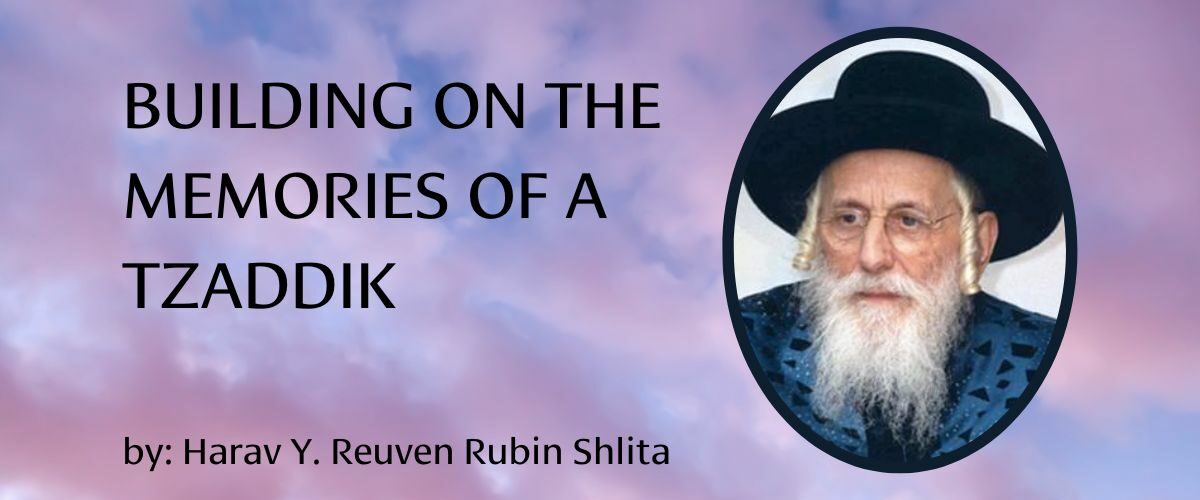BUILDING ON THE MEMORIES OF A TZADDIK
Print Friendly Version
BUILDING ON THE MEMORIES OF A TZADDIK
Harav Y. Reuven Rubin Shlita
Anyone blessed to have witnessed the avodah of the Bobover Rov, Rebbe Shlomo ztl will tell you that his every movement was touched by spirituality and grace. One looked on in wonder; his tefillah was the actualisation of the poetry of the Yiddisher neshoma in all its glory. There was no such thing as a simple brocho; each utterance was invested with his entirety.
I always find myself feeling his loss in times of difficulty. His splendour kept us all feeling positive; nothing was beyond hope; everything was replete with his infectious love for Klal Yisroel.
We were the first generation, the community built from the embers of disaster. Yet there was never doubt; in his circle of light darkness never had a place.
When, inevitably, sadness visited the community, his voice was raised above everyone else’s, his cries pierced both the heavens and our hearts, yet with the power of his tears we all found healing.
I witnessed this at times of great challenges, such as the passing of loved ones and his first sight of the Mokom Hamikdosh from afar (this was before Yidden had access to the Kossel). The Rov’s normal fast pace would falter, his steps broken by the pain. His Kaddish was of one who knew what loss meant, his crying was beseeching. We felt how this leader was our father, and his pain gave us space to grieve and heal.
The kaleidoscope of his daily avodah was infused with light, touched by the ever-changing shapes of human life with all its frailties.
All these thoughts are tumbling out of my mind on this day, Rosh Chodesh Av, the Rov’s yohrzeit. How much we need him today; the world is crumbling under the weight of meaningless dogma that is sweeping away everything that held some moral rectitude. The world around us howls at us with age-old hate, despising the grandeur of our sacred ways. One can sink into despair, we have come so far and yet we see the depths of a surrounding society dragging and grasping at our young.
Then I reach out to the memories of the Rov’s emotional leadership, his understanding eyes, and I feel a sense of hope. We are a continuation of the voyage the Rov and others of the She’airis Hapleitah started. They gave their every fiber to rebuild. The edifice that was constructed by their tears is the glory of what is today’s Torah world.
I know this present challenge is yet another stop in the journey of Klal Yisroel, the journey that will lead us to our total redemption.
We will soon be fasting through yet another Tisha B’Av, sitting on the floor, the ashes of generations still leaving their bitterness on our tongue. We must believe that this is another step towards our redemption. The wheels of eternity grind on, bringing us closer to the moment when all becomes known and understood. Our teachers, the tzaddikim who rebuilt, gave us the realisation that everything is possible.
I realise that many who are reading these words will be far removed from the days of which I speak. In a world where fifteen minutes seems a long time, memories of old men may not mean all that much. I write because I know in my heart that there will be a time when people will turn for these memories, and I hope my stumbling words will find resonance.
After all, the Rov gave me semicha to be a writer. Many years ago, I was torn between furthering my secular or what was then termed “Englisha” education or taking another direction and learning in a full-time Beis Medrash programme. I was a young bochur learning in an out-of-town yeshiva. Full-time learning was not yet the norm so I went to the Rov with this vexing question. He smiled at me with his radiant face and gently said, “Reuven, du kents shown genuk English, taka di kents zair gut English.” “Reuven, you know already enough English; in fact, you know very good English.”
With this I joined a demanding Beis Medrash programme in yeshiva and the rest, as they say, is history. The Rebbe’s words may have seemed off-hand, but with that Tzaddik, everything was part of his tapestry of avodah.
So, I share these memories, hopefully making some sense in my unschooled English, and pray they will find a place in the hearts of Yidden who fear the present. We must focus on the kedusha we have all around us, and with that, we will illuminate the neshomas of tomorrow.

